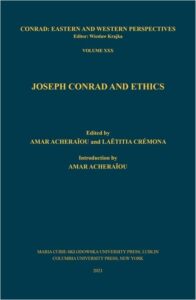 Joseph Conrad’s ethical perspective is one of the deepest in twentieth-century fiction, yet it has been overlooked in recent scholarship. This wide-ranging and original book I co-edited with Laëtitia Crémona (Université de Montréal) offers a thorough and in-depth analysis of ethics in Conrad’s fiction that challenges and extends current academic debates. The contributors examine Conrad’s representation of ethics in the light of Levinas, Derrida, Foucault, Deleuze, and Ricoeur, among others. Through detailed studies of works such as “Heart of Darkness,” The Secret Agent, Lord Jim, and Under Western Eyes, they navigate the conflicted terrain of ethics and morality and highlight Conrad’s ambivalence toward ethics.
Joseph Conrad’s ethical perspective is one of the deepest in twentieth-century fiction, yet it has been overlooked in recent scholarship. This wide-ranging and original book I co-edited with Laëtitia Crémona (Université de Montréal) offers a thorough and in-depth analysis of ethics in Conrad’s fiction that challenges and extends current academic debates. The contributors examine Conrad’s representation of ethics in the light of Levinas, Derrida, Foucault, Deleuze, and Ricoeur, among others. Through detailed studies of works such as “Heart of Darkness,” The Secret Agent, Lord Jim, and Under Western Eyes, they navigate the conflicted terrain of ethics and morality and highlight Conrad’s ambivalence toward ethics.
This volume pivots around a fundamental Conradian ethical paradox: how to account for ethical responsibility in a world not meant for ethics in the first place and, as Conrad stated, whose “aim cannot be ethical at all.” It demonstrates that Conrad adopts a planetary ethics that embraces the human condition in its universality, while he also doubts the viability of ethics itself. Through his protagonists’ moral predicaments, he expresses both the necessity of ethics in human relationships and the impossibility of individual ethical fulfillment.
Joseph Conrad and Ethics is volume 30 of the series Conrad: Eastern and Western Perspectives, edited by Wiesław Krajka. The articles included in the volume offer wide-ranging, original perspectives on ethics which open new venues in Conrad scholarship that will greatly benefit scholars and students of Conrad, modernism, and ethics.
Contents
Amar Acheraïou – Introduction
Amar Acheraïou – Narrative and Ethics: Being, Meaning, and Reading
Aileen Miyaki Farrar – Narrative Autophagy and the Ethics of Storytelling in “Heart of Darkness”
J. A. Bernstein – Under Straining Eyes: Joseph Conrad and the Problem of “Moral Luck”
Thomas Higgins – “He died for the Revolution”: Anarchism and Ethical Commitment in The Secret Agent
Catherine Delesalle-Nancey – Ethics as The Secret Agent in Joseph Conrad’s Novel
Laëtitia Crémona – Ethics, Aesthetics, and Politics in Hitchcock’s Sabotage
Nathalie Martinière -An Ethics of Uneasiness: Reading Joseph Conrad’s African stories with Francis Bacon
Subhadeep Ray – “After such knowledge what forgiveness?”: Nature, Community and Individual Ethics in Joseph Conrad’s “Because of the Dollars” and Adwaita Mallabarman’s A River Called Titas
Harold Ray Stevens -The Cross of Christ as Afterthought: Killing the Christian Ethic at “An Outpost of Progress”
